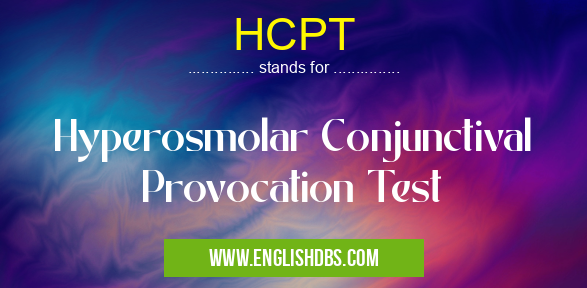What does HCPT mean in UNCLASSIFIED
HCPT stands for Hyperosmolar Conjunctival Provocation Test. It is a diagnostic test used to assess the integrity of the tear film and the conjunctiva, which is the clear membrane that covers the white part of the eye and lines the inside of the eyelid. The test involves instilling a hyperosmolar solution into the eye and observing the response of the tear film and conjunctiva.

HCPT meaning in Unclassified in Miscellaneous
HCPT mostly used in an acronym Unclassified in Category Miscellaneous that means Hyperosmolar Conjunctival Provocation Test
Shorthand: HCPT,
Full Form: Hyperosmolar Conjunctival Provocation Test
For more information of "Hyperosmolar Conjunctival Provocation Test", see the section below.
Procedure
The HCPT is performed by instilling a drop of a hyperosmolar solution, such as sodium chloride or urea, into the lower conjunctival sac of the affected eye. The patient is then asked to keep their eyes open for a set period of time, typically 5 minutes.
Interpretation
The response to the hyperosmolar solution is observed by the examiner. A positive HCPT is characterized by the following findings:
- Conjunctival hyperemia: Redness of the conjunctiva
- Tearing: Excessive tear production
- Pain or discomfort: The patient may experience a burning or stinging sensation
- Corneal staining: The cornea may develop small, superficial punctate erosions
A negative HCPT indicates that the tear film and conjunctiva are intact and functioning properly.
Applications
The HCPT is used to diagnose and monitor various eye conditions, including:
- Dry eye syndrome: A condition characterized by insufficient tear production
- Conjunctivitis: Inflammation of the conjunctiva
- Corneal abrasions: Scratches on the cornea
- Sjögren's syndrome: An autoimmune disorder that affects the tear glands and other exocrine glands
Essential Questions and Answers on Hyperosmolar Conjunctival Provocation Test in "MISCELLANEOUS»UNFILED"
What is the Hyperosmolar Conjunctival Provocation Test (HCPT)?
The HCPT is a non-invasive eye test that assesses the stability of the tear film and the function of the corneal nerves. It involves instilling a drop of hypertonic saline solution into the eye and observing the response.
How is the HCPT performed?
A drop of concentrated (5%) saline solution is placed in one eye, while the other eye serves as a control. The doctor then observes the eye for any signs of irritation, such as redness, tearing, or discomfort.
What does a positive HCPT result indicate?
A positive HCPT result suggests that the tear film is unstable, which may be due to conditions such as dry eye syndrome or corneal nerve damage. The severity of the response is graded on a scale of 0 to 3, with 0 indicating no response and 3 indicating a severe response.
What are the potential complications of the HCPT?
The HCPT is generally considered a safe procedure, but it may cause temporary discomfort in some patients. Allergic reactions or corneal abrasions are rare but possible.
Who should consider getting an HCPT?
The HCPT is often used to diagnose dry eye syndrome and other conditions that affect the tear film or corneal nerves. It may also be used to monitor the effectiveness of treatment for these conditions.
How long does the HCPT take?
The HCPT typically takes around 5-10 minutes to perform.
Final Words: The HCPT is a simple and non-invasive test that can provide valuable information about the health of the tear film and conjunctiva. It is an important tool for diagnosing and managing various eye conditions.
